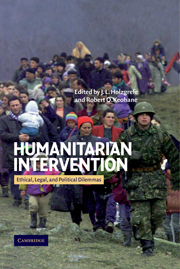Book contents
- Frontmatter
- Contents
- List of contributions
- Acknowledgments
- Introduction
- PART I The context for humanitarian intervention
- PART II The ethics of humanitarian intervention
- PART III Law and humanitarian intervention
- PART IV The politics of humanitarian intervention
- 8 Political authority after intervention: gradations in sovereignty
- 9 State failure and nation-building
- Select English language bibliography
- Index
8 - Political authority after intervention: gradations in sovereignty
Published online by Cambridge University Press: 27 July 2009
- Frontmatter
- Contents
- List of contributions
- Acknowledgments
- Introduction
- PART I The context for humanitarian intervention
- PART II The ethics of humanitarian intervention
- PART III Law and humanitarian intervention
- PART IV The politics of humanitarian intervention
- 8 Political authority after intervention: gradations in sovereignty
- 9 State failure and nation-building
- Select English language bibliography
- Index
Summary
Military interventions for allegedly humanitarian purposes, not authorized by the United Nations Security Council, have created sharp disagreements among students of international law. At first, the principal focus of this debate was on the decision to intervene. More recently, however, there has been increasing attention to policies to be followed after intervention. Both the Kosovo Report, issued in November 2000 by an independent commission co-chaired by Justice Richard Goldstone and Carl Tham, and The Responsibility to Protect, the Report of the International Commission on Intervention and State Sovereignty, co-chaired by Gareth Evans and Mohamed Sahnoun, issued in December 2001, have emphasized the importance of post-intervention action. Economic and political reconstruction is widely seen as essential if the purposes of military intervention are to be achieved.
Attention to the prospects for successful institution-building is also crucial to a sensible evaluation of whether to intervene in the first place. That is, it is important to estimate the probability that intervention will lead to a non-abusive, self-sustaining structure of political authority. Evaluations of the legitimacy, or prudence, of humanitarian intervention should be conditional on estimates of eventual political success. Decisions “before intervention” should depend, to some extent, on prospects for institution-building “after intervention.”
For understandable reasons, the major commission reports referred to above have sought to reinterpret rather than to devalue the concept of sovereignty.
- Type
- Chapter
- Information
- Humanitarian InterventionEthical, Legal and Political Dilemmas, pp. 275 - 298Publisher: Cambridge University PressPrint publication year: 2003
- 34
- Cited by



